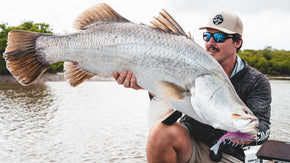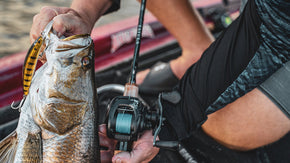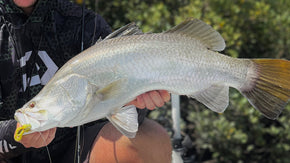Posted 11th July 2025
Ten tips for angling success


By Robert Thornton
Fishing is a pastime where it can take years to master even the basics, and depending on the techniques and species involved, the challenge can sometimes feel overwhelming. Given the diverse nature, it’s difficult to offer universal tips for anglers wanting to improve their skills; but that’s exactly what we’ll be doing in this blog!
These ten tips are foundational to angling of any kind and can be applied to different species and techniques in Australia and around the world. So, whoever and wherever you are, whatever you’re targeting, and however you plan to do it, if you want to know how to catch more fish, read on!
KNOWLEDGE AND EXPERIENCE
Like with most pursuits, knowledge is the key to success, and one of the best ways to gain knowledge (amongst other things) is through experience. In a similar way, your experiences are informed by the knowledge you gain prior to that experience. Both knowledge and experience feed off one another, and in fishing it’s virtually impossible to build on one without the other.
The ten tips below are centred on these two core concepts, and involve practical, theoretical and mechanical elements.

TEN TIPS FOR ANGLING SUCCESS
1. Match your gear to the situation
This may seem like an obvious one, but I can’t stress enough the importance of using the right tackle for the job. Working in a tackle store, it’s amazing how often I see people looking to purchase gear that’s not suited to their intended application. You wouldn’t use an air rifle to hunt an elk or a putter to drive a ball across the green, so it makes sense to match your tools to the situation when out on the water. If you’re not sure, ask the staff at the tackle shop or anyone with experience doing what you intend to do.
2. Practise knots and rigs
Getting things right on the business end is often overlooked. When you consider that rigs and knots are ultimately what keep you connected to the fish, practising them and getting them right is a no-brainer! Having the basics down pat before you hit the water will save time when you are on the water and maximise your chance of success once you’ve got that fish of a lifetime pinned. You can check out our basic knot guide here, and learn a few simple bait fishing rigs here.

3. Practise your casting
Casting proficiency is an asset, particularly when lure fishing. Lures usually need to be presented to the fish, not thrown out for them to find, and this is where casting accuracy can be a game changer. Practising your casting is easy: just grab the outfit you want to practise casting with and tie any hookless and appropriately weighted item on the end such as a sinker, casting plug, or even a lure with the hooks taken off. If you don’t have a big enough yard, the local park or other public space will do. It’s a good idea to try casting at targets from various angles and distances with a range of techniques. Doing this will ensure you’re prepared in future situations when delivering lures with pinpoint precision is necessary to get the bite!
4. If it’s not working, change it
You might have heard this one before, but I feel this one is often misunderstood. A change could be as drastic as moving to a new location, or as subtle as adjusting the speed of your retrieve. Whatever the situation, it’s important to change something if it’s not working. A good tip is to start with small changes, such as your bait type, lure colour, retrieval, sink rate and so on. If changing some of the small things hasn’t improved your fortunes, changing things like the technique, structure type or even the location altogether may be the next logical step. In any case, make sure to start with small changes; often a subtle adjustment to your approach is all that’s needed!
5. Don’t discount something if it hasn’t worked once
This one is very important and builds on the last one. I often hear from anglers who try something once, be it a particular lure, location, technique etc., and never revisit it when it fails to bear fruit on the first go. Trying the same thing over and over and expecting different results is a well-known definition of madness, however this can be misleading for anglers. For example, casting lure in a spot for an hour for nil result and then returning to the same location the next day to repeat the process is not as ‘mad’ as you might think. In the passage of 24 hours, environmental factors such as temperature and tide are likely to be different from the previous day. Fast forward to six months later and you’re almost guaranteed to have an entirely different set of circumstances, where casting that same lure in that spot could yield the desired result!

6. Research
When learning anything there’s nothing more important than research. The quality of your research will guide the practical learning that follows, and these days it’s easier than ever to get your hands on information from the comfort of your home! Whether it’s a new location, species or technique you’re looking to learn about, there will be books, magazines, internet videos and blogs like this one to help kick-start your journey. Research of this kind won’t necessarily get you to your destination, but it will show you which paths to take, and where to start looking for whatever it is that you seek.
7. Reconnaissance
Recon is something I’m a big believer in, and there’s a few reasons why I like it. Mapping technology has really changed the recon game, but I feel there’s no substitute for going there and observing things in real time. Additionally, being on location without any fishing gear forces you to observe what’s going on and you may even notice things that you wouldn’t have otherwise if you were fishing. Recon doesn’t have to eat into your fishing time either, and can be done with limited time when you happen to be nearby the location for other reasons, such as driving to work or walking the dog. Getting a lay of the land before you even wet a line is very helpful when preparing for the maiden voyage, as opposed to going in completely blind.
8. Listen to locals
One of the best learning resources is chatting to those with experience. While not all anglers will be willing to share all the local secrets that they learnt themselves over many years, most will happily offer a clue or two, which can sometimes make all the difference. Whether you meet them on location, in the tackle shop, the pub, the boat ramp, or even online, always remember that locals are an invaluable source of information.
9. Keep a diary
Admittedly, this is something I didn’t start doing until quite recently. A diary can be as simple as a few notes jotted into a notepad or phone after each session, or a complete spreadsheet with information fields for things like the moon phase, barometric pressure, wind speed and so on. There are even apps available for anyone who wants to keep a log of their fishing. Keeping a fishing diary is a great way to learn as you go, and logging information from each trip may uncover the keys to success at a particular spot or for a certain species. The trick is to log anything you feel may be relevant, and after a while you should hopefully notice patterns related to successful and unsuccessful missions. Remember, you can learn just as much from the unsuccessful trips as you can from the successful ones! I’ve covered the ideas discussed in tips 4, 5, 6, 7, 8 and 9 in more detail in this blog if you’d like to learn more.
10. Keep an open mind
The final tip, and one that I see as one of the most important, is to keep an open mind. Human beings can easily fall into confined ways of thinking that become habit, and without an open-minded approach these ideas and practises can be reinforced and passed on to others. If you want to develop as an angler, it’s crucial to keep the mind open at all stages of your journey. You may hear something from a local that sounds like a crock, or read a blog with seemingly incorrect information, or even witness things on the water that your mind struggles to comprehend. Granted, not everything you see, hear or read is going to be helpful, but closing yourself off to all of it once you’ve found some success will only keep you in the same spot. I’ve heard things from customers that I probably wouldn’t have believed or tried myself 10 years ago, however these days I’ve found that my knowledge and understanding is constantly expanding because I keep an open mind. Don’t believe everything, but don’t discount anything!
TEACH A PERSON TO FISH
These tips aren’t exactly the 10 commandments, but hopefully they can help you up your game on the water. If you’re struggling to find success consistently, I encourage you to try some of the things listed above. You’re guaranteed to at least learn something, and as they say, “a lesson learned is a lesson earned.”
















